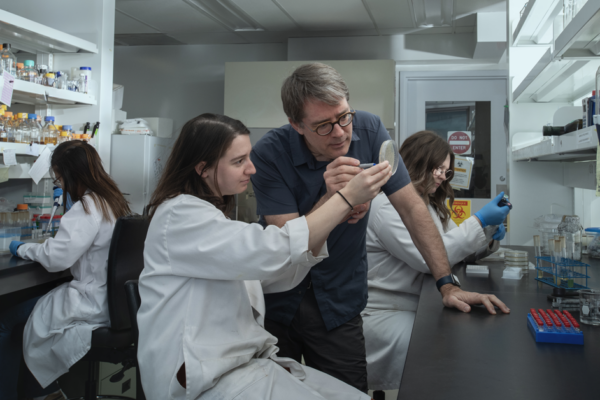-
YOU ARE
- Community member
- Future Student
- Student
- Professor
- Alumni
- Media
- Guidance counsellors
- INRS retiree
- Contact Us
- Newsroom
- Careers
- FR
-
Studies
We teach the next generation of researchers to develop scientific, social, and technological innovations.
-
Research
We find solutions through interdisciplinary research and industry or public and community partnerships.
-
INRS
We play an active role in Québec's economic, social, and cultural development.
The Canada Research Chair in Fundamental and Applied Sociomicrobiology aims to better understand the social behavior of bacteria and develop new treatments to control their virulence. Its work will explore how bacteria communicate with each other in order to develop treatments to interrupt this communication.
Chairholder
Eric Déziel, professeur
Context
In their natural ecosystems, bacteria persist as microbial communities, where they exploit complex systems of intercellular interaction and communication to adapt to changing environmental conditions. “Socio-microbiology” is an emerging discipline that studies how bacteria function in communities and how the social interactions between microorganisms influence their behavior and activities, which have an impact on human health. In addition, antibiotic resistance is on the rise. New alternatives to conventional antibiotic therapies, such as strategies based on antivirulence, are becoming urgent as we enter a post-antibiotic era.
Objectives
The main objectives of this Chair are to deepen our understanding of the social behavior of pathogenic bacteria and to develop innovative treatments to directly control their virulence or tolerance to antibiotics, and thus prevent infections. The process used by bacteria to communicate with each other is called “quorum sensing”. The way in which pathogens exploit quorum sensing to coordinate infections and tolerate antibiotics is being studied in order to develop ways of interrupting the communication processes necessary for pathogenesis.
The Chair’s research program is structured around three main themes. The first research theme studies species-specific quorum sensing targets in order to develop antivirulence strategies. Particular attention is paid to the human opportunistic pathogen Pseudomonas aeruginosa. The second theme addresses how social interactions between microorganisms promote the development of communities and group behaviors. This research examines how shared metabolites could be exploited to control antibiotic tolerance. Biofilms are aggregates of microbes adhering to a surface and embedded in an exopolysaccharide matrix. They are extremely resistant to eradication. Quorum sensing is essential for the development of resilient biofilms and their emergent properties, such as social cooperation and antimicrobial tolerance. Some bacterial species can inhibit quorum sensing through competition via metabolites and enzymes. Thus, the third research theme is devoted to the different ways in which multispecific interactions and ecological competitors can disrupt the colonization of biofilms by pathogenic bacteria.
Overall, this sociomicrobiology research program will contribute to our understanding of the microbial world and the development of new strategies to protect and improve human health.

